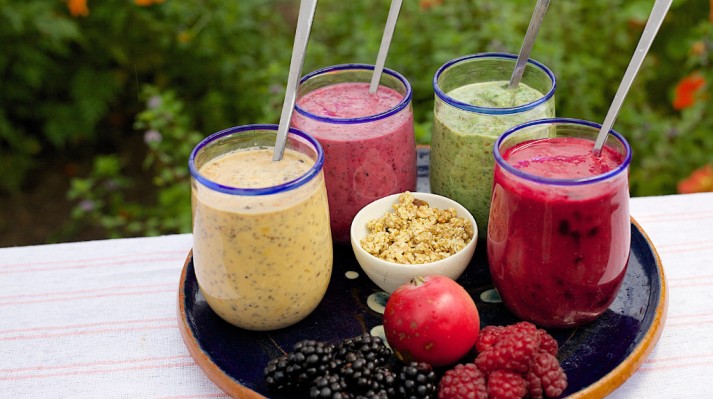Have your digestion issues always hindered your overall well-being and strained your immunity? This can signify poor and unmaintained gut health. In the recent scenario, gut health is considered to be a major area within nutritional science and holistic wellness. We mainly underestimate our digestive system, which is a complicated ecosystem and is highly impactful for our overall health. As per the research, there is a strong link between our gut health and other aspects of well-being. So, it is vital to nurture your gut health with effective benefits.
If you follow a balanced diet and a proper lifestyle, your gut microbiome will remain healthy with a better intestinal barrier, normal gut physiology, immune tolerance, etc. On the other hand, an unbalanced diet will minimize the diversity of your gut microbiome. This will lead to chronic gut inflammation.
Here, we will learn some well-researched tips from the experts to help you improve and maintain a healthy gut.
What is Gut Health?
Gut health is known to be the balancing and functioning of the gastrointestinal tract, mainly the trillions of microorganisms like viruses, bacteria, and fungi. These microorganisms are collectively termed as the gut microbiomes. The following microbes play a significant role in our digestion, starting from breaking down the food, synthesizing important nutrients, etc.
If your gut remains healthy, it will give rise to diverse microbes, access precise nutrient absorption, and restrict pathogens. A healthy gut is also linked to our overall well-being with the help of the gut-brain axis, giving rise to better mental health and mood.
Signs of an Unhealthy Gut
If your gut health remains imbalanced, it can lead to several health concerns. Some of the prominent symptoms of an unhealthy gut can be excessive gas, bloating, constipation, diarrhoea, abdominal discomfort, etc. Other than this, some more serious ones are brain fog, fatigue, eczema, and acne, along with weakened immunity.
As the gut impacts the inflammation levels, gut issues can lead to chronic conditions like irritable bowel syndrome, metabolic issues, and autoimmune disorders. Poor gut health also interrupts the body’s capability to absorb important nutrients, giving rise to deficiencies in overall health.
Dietary Tips to Improve Gut Health
Here, we learn some of the most efficient dietary tips to improve your gut health:
Eat a Variety of Fibre-Rich Foods
It is essential to include dietary fiber in your food chart as it helps promote the growth of crucial bacteria and helps in digestion. Fiber is also capable of improving bowel movements and enriching millions of gut microbiomes.
Items with good sources of fiber include grains like oats, quinoa, brown rice, etc. You can also consider legumes like beans and lentils. Leafy greens, along with fruits and vegetables, are also essential for a better diet.
Include Probiotics and Fermented Foods
Including probiotics in our diet can leverage many beneficial attributes for our gut. It introduces important bacteria into the gut, through which your digestion will be improved, and it strengthens your immunity.
Some of the items that are known to be rich in probiotics are kimchi, kefir, miso, sauerkraut, etc. These items will help you revive the microbial balance.
Consume Prebiotic Foods
Prebiotics are known to be non-digestible fibers that are capable of feeding beneficial bacteria in your gut system. So, including prebiotic foods is considered essential to improving your gut health.
Food items that are great sources of prebiotics are bananas, garlic, onions, oats, asparagus, etc.
Stay Hydrated
If your body remains hydrated, it will keep your gut lining healthy.
You can start by drinking a lot of water and including herbal teas in your diet to restrict constipation. These steps will automatically lead to better gut mobility.
Limit Processed and Sugary Foods
Excessive sugary and processed foods can disturb the gut bacteria, which will give rise to poor digestion and inflammation.
Make sure to minimise artificial sweeteners from your diet along with refined carbohydrates that can minimize the level of healthy microbiomes.
Lifestyle Changes for a Healthy Gut
Let us define how lifestyle changes can improve your gut health to its core:
Manage Stress Levels
The gut-brain axis mainly connects the brain and your gut. This implies that your stress can directly hamper your gut health. If you are facing chronic stress, it can disturb your gut bacteria along with increased inflammation and digestive issues like IBS and bloating.
So, as per the experts, you need to manage your stress by practicing mindfulness like deep breathing, meditation, and journaling to revive your gut balance. You have to also encourage regular exercise and maintain any hobbies.
Prioritise Quality Sleep
In the recent era, most youngsters have poor sleep cycles. Such behaviors can further disrupt your gut microbiomes and will imbalance your immunity and digestion. Irregularity in the sleep pattern can make you crave unhealthy food items that can directly hamper your gut bacteria.
To encourage your sleep quality, you need to maintain a consistent bedtime routine. Lessen your screen time before going to sleep, prefer a quiet and comfortable sleeping environment, and keep your room cool and dark for better effects.
Exercise Regularly
Better physical activities can improve your gut health and encourage digestion. If you exercise regularly, it will promote gut mobility, restrict bloating, and reduce constipation.
You can primarily go for moderate activities like yoga, walking, strength training, etc. These activities can help you give rise to a gut-friendly lifestyle.
Avoiding Gut Health Disruptors
You have to avoid these disruptors to maintain good gut health:
Minimise Antibiotic Overuse
Antibiotics are critical for preventing bacterial infections, but overuse can affect your gut health by eliminating the beneficial bacteria along with the harmful ones. These problems can disrupt your digestion, gut balance, and overall immunity.
You need to take antibiotics as per the prescription of the certified doctors and avoid overusing them. After completing your antibiotics course, you can prefer fiber-rich foods and prebiotics to restore gut health.
Reduce Alcohol and Caffeine
Extreme alcohol consumption can damage your gut lining and disturb the digestion and gut bacteria balance. It also gives rise to inflammation and leaky gut syndrome.
On the other hand, excessive coffee consumption can also lead to acid reflux and digestive problems. So, you need to switch to gut-friendly alternatives such as kombucha, herbal teas, and water.
Avoid Artificial Sweeteners
If you consume artificial sweeteners daily, it can negatively impact your gut bacteria. It will minimize your microbial diversity.
You can switch to natural options like honey, stevia, and maple syrup for better gut health.
Practical Tips to Maintain Gut Health
Let us consider some practical tips to improve gut health:
Eat Mindfully
If you follow mindful eating, it will improve your digestion by allowing your body to effectively absorb and break down the nutrients. Eat slowly and chew it properly to ease the digestive process.
Make sure to avoid distractions such as screen time during meals. Prevent overeating by understanding your hunger pattern.
Regular Meal Patterns
Keep your eating schedule consistent and regulate it properly to maintain the natural rhythm of your gut. A better meal pattern will promote digestion and balance the gut bacteria. Avoid skipping meals and irregularities.
You can go for intermittent fasting, where you have to fast for several hours to give a break to your digestive system.
Include Seasonal and Diverse Foods
A seasonal and diverse food range will nourish several strains of gut bacteria and will give rise to a resilient microbiome. Add a range of fresh seasonal fruits and vegetables to acquire antioxidants, nutrients, and fiber for your body.
You can also go for whole grains and fermented foods to enhance your gut health.
Supplements for Gut Health
Here are some probiotic supplement options for your gut health:
Probiotic Supplements
You need to consider probiotic supplements when your diet alone is not sufficient to restore gut balance. You can consider it mainly after any antibiotic usage, after illness, or if you have any digestive issues.
You can prefer strains such as Lactobacillus and Bifidobacterium to promote your microbial diversity.
Prebiotic Fibre Supplements
This fiber supplement nourishes your gut bacteria by delivering the fiber they require. With the inclusion of prebiotics, you can feed the existing beneficial bacteria and help it multiply.
You can prefer prebiotic options such as insulin, psyllium, and husk to support digestion and enhance the gut system.
Monitoring and Improving Gut Health Over Time
Through these steps, you can monitor the improvements in your gut health:
Track Your Symptoms
Maintain a food and symptom diary to verify the patterns and aspects impacting your gut health. Note down the meals, overall well-being, and digestive reactions.
Tracking the symptoms will allow you to adjust your dietary processes.
Regular Health Check-Ups
If the gut issues persist for a long time, consult a professional healthcare provider and go for advanced tests like microbiome analysis.
This will provide you with a detailed insight regarding bacterial imbalances and will deliver a personalized solution.
How A Gut Health Nutritionist Can Help You
Are you also willing to improve your gut health? Consider the expertise of a dietitian and nutritionist of Qua Nutrition. We deliver a personalized diet plan and strategies as per your preferences and lifestyle choices. Our experienced and qualified gut health nutritionists have helped numerous clients. So, let your gut health acquire convenience and stay healthy with Qua Nutrition! Contact us today!









